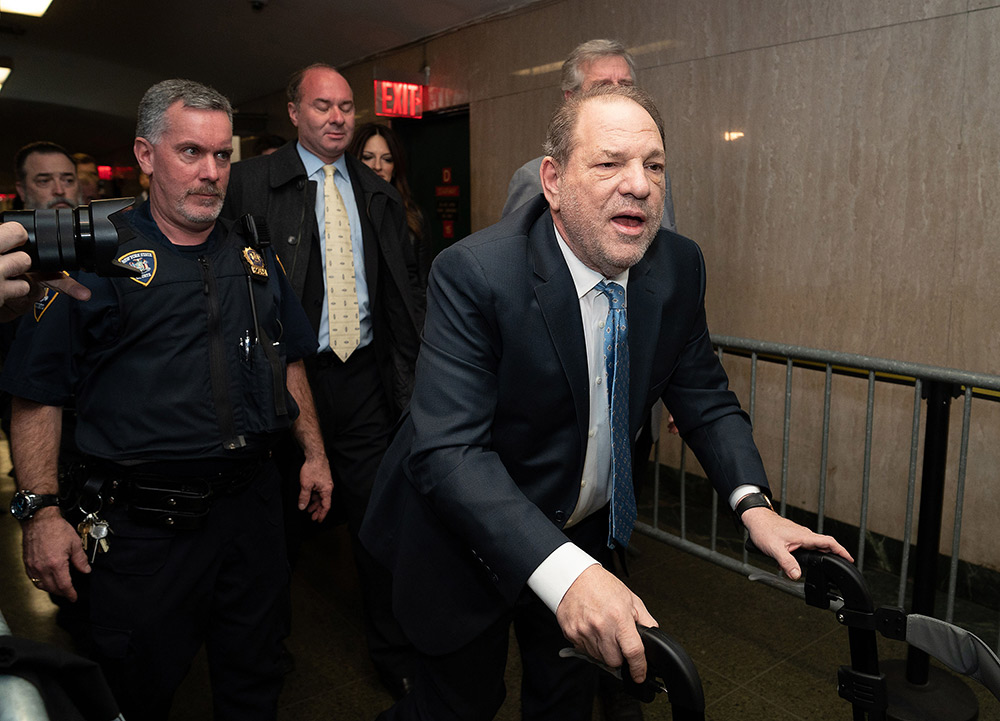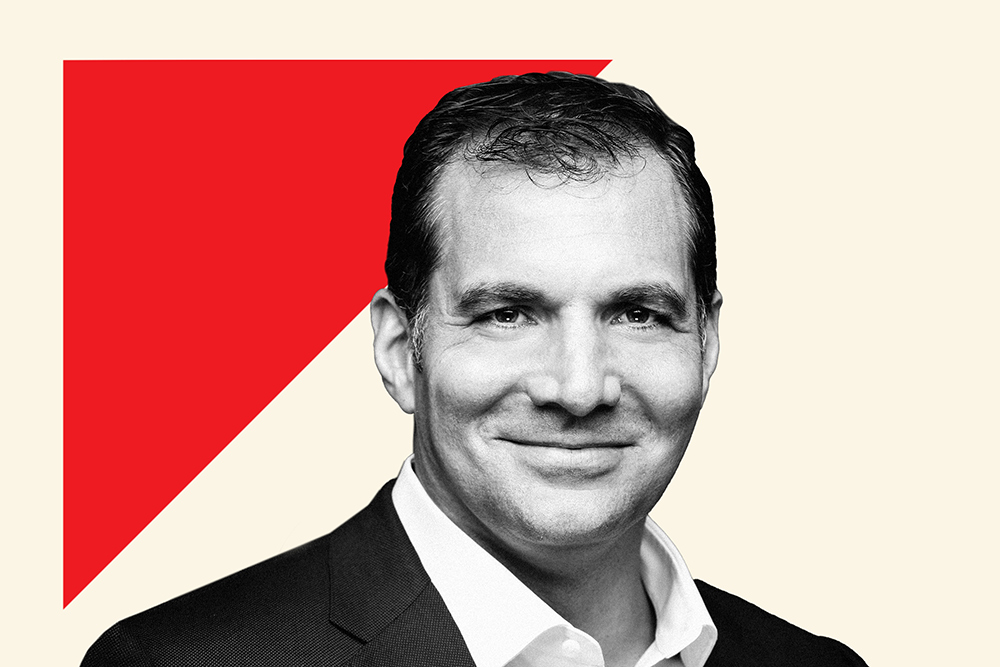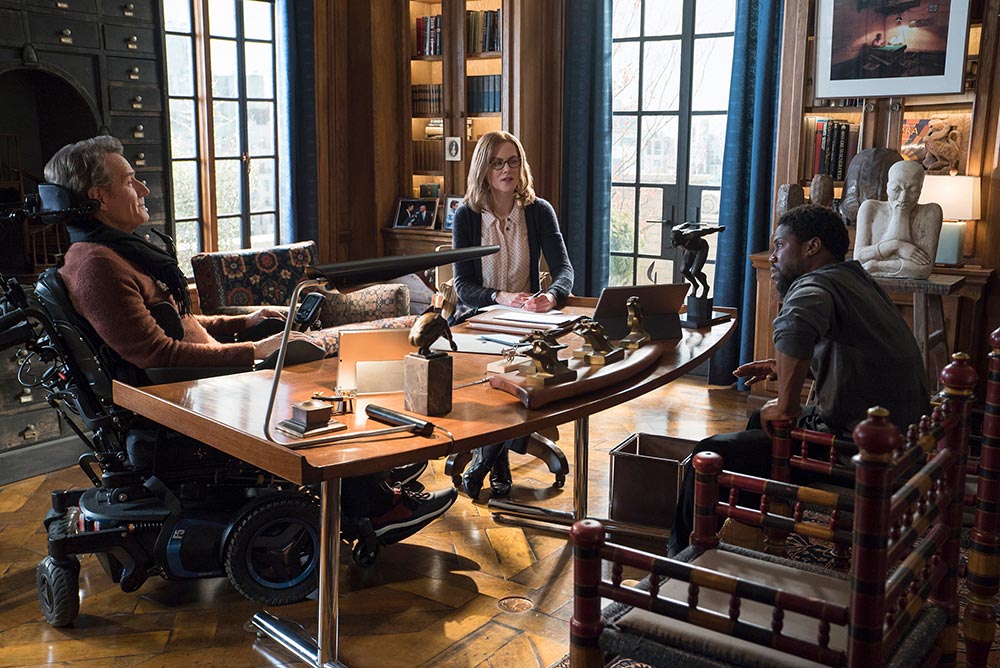2018年年初,,哈維?韋恩斯坦和鮑勃?韋恩斯坦創(chuàng)立的傳奇的電影公司岌岌可危,。
多名女性指控哈維?韋恩斯坦性侵,加上多年來隱藏在公眾視線之外的管理不善和腐敗問題,,使得這家制作了《白宮管家》,、《帕丁頓熊》和《非常小特務(wù)》等影片的制片公司遭受重創(chuàng),。銀行準備取消所投資電影的抵押贖回權(quán),,這家頂級電影公司即將分崩離析。

好萊塢的電影圈一時間議論紛紛,,甚至有人希望,,當(dāng)大部分電影公司把目光轉(zhuǎn)向大片時,這個仍然在支持昆汀?塔倫蒂諾等天才導(dǎo)演拍攝非主流中等預(yù)算影片的知名獨立電影公司,,能夠像《殺死比爾》(塔倫蒂諾與韋恩斯坦合作出品的復(fù)仇影片)中新娘暗殺名單上的名字一樣,,灰飛煙滅。
然而,,韋恩斯坦影業(yè)公司找到了英雄般的拯救者,,他是一位來自美國得克薩斯州,、從未涉足過電影業(yè)的重組專家。這著實令人大跌眼鏡,。
2018年7月,,Lantern Capital Partners公司的首席執(zhí)行官安迪?米切爾,以3.5億美元現(xiàn)金購買韋恩斯坦影業(yè)的破產(chǎn)資產(chǎn),,并承擔(dān)債務(wù),。
安迪?米切爾曾經(jīng)幫助南加州愛迪生電力公司和通用汽車金融公司度過金融危機,并成功復(fù)活了一家鋅回收企業(yè),、一家學(xué)校用品零售商和一家聲名狼藉的分時度假銷售商,。
電影圈中的資深人士預(yù)言,沒有人會把錢花在一個曾經(jīng)以韋恩斯坦之名命名的機構(gòu)上,。
令他們驚訝的是,,在Lantern買入韋恩斯坦影業(yè)后的第一年,米切爾就親自運營這家公司,,并且獲得極高的票房,,成功吸引了一流的合作伙伴和一位明星首席執(zhí)行官加盟,重啟電影和電視節(jié)目的制作,。
他還高價出售了影片庫中的電影,,因為宅家不出的人們都喜歡看諸如《驚聲尖叫3》和《烏云背后的幸福線》這樣的影片。
(與此同時,,哈維?韋恩斯坦在2020年年初被判有罪,,并因為強奸和性侵犯罪被判處23年監(jiān)禁。)
新名字新氣象
米切爾在7月15日收盤時,,宣布了一項重大決定:公司于2019年更名為Spyglass Media Group,,將其影片庫(277部電影)中的大部分影片出售給制作了《愛樂之城》和《饑餓游戲等熱門影片,并擁有Starz有線電視網(wǎng)絡(luò)的獅門公司,。
獅門公司還將向Spyglass投入一筆新的資金,,專門用于制作新的電影和電視節(jié)目,以換取20%的股權(quán),。米切爾的 Lantern持股最多,,其余股份由現(xiàn)有的少數(shù)投資者持有,包括華納兄弟,、Cineworld(Regal Cinemas的所有者),、意大利的Eagle Pictures以及Spyglass的首席執(zhí)行官、米高梅的前首席執(zhí)行官加里?巴伯,。
米切爾在把公司交給巴伯之前,,負責(zé)了第一年的運營。他仍然是公司的董事會成員,并通過Lantern的投資,,成為公司的大股東,。

這筆交易正式令Spyglass成為了一棵搖錢樹,,在確保之前臭名遠揚的公司名稱不復(fù)存在的同時,將韋恩斯坦兄弟在公司鼎盛時期打造的系列電影,,以及他們培養(yǎng)獨立電影制片人的傳統(tǒng)保留延續(xù),。
米切爾在接受《財富》雜志的深度訪談時稱,出售影片庫,,將讓他的投資人以及華納,、Eagle和其他股東在Spyglass投資的每一塊錢,都可以獲得回報,,“獲得可觀的利潤”,。
簡而言之,這筆交易給Spyglass帶來的收益遠遠超過了米切爾為挽救韋恩斯坦影業(yè)花費的3.5億美元,。不過負責(zé)人沒有透露具體的購買價格,。
最重要的是,Spyglass將擁有足夠的資金和知識產(chǎn)權(quán)來制作獨立電影,。既可以按照韋恩斯坦的老節(jié)奏,,也可以選擇兄弟倆的最佳拍檔——從低成本到5000萬美元左右的文藝片。
Spyglass保留了制作電影的權(quán)利,,比如即將上映的《驚聲尖叫5》是該系列電影的最新作品,,還有處于前期制作階段的《猛鬼追魂》。它還繼續(xù)與NBC環(huán)球旗下的Bravo網(wǎng)絡(luò)聯(lián)合制作其熱播電視真人秀《天橋驕子》(第17季剛由Spyglass完成拍攝),。
Spyglass保留了影片庫所有電影的知識產(chǎn)權(quán),,以擴展或翻拍之前的系列電影?!睹凸碜坊辍?、《非常小特務(wù)》和《驚聲尖叫》系列中的新作品都備受期待。
米切爾還在著手制作能夠傳承《烈火戰(zhàn)車》經(jīng)典的勵志電影,,該電影改編自暢銷書《激流男孩》,,講述了華盛頓大學(xué)的賽艇隊在1936年柏林奧運會上奪得金牌的故事。
米切爾說:“我們將是一家純制片公司,,每年制作五到六部電影和數(shù)量相當(dāng)?shù)碾娨暪?jié)目。重要的是質(zhì)量,,而不是數(shù)量,。大制片公司開銷巨大。讓所有人都忙活起來壓力可不小。他們一年要拍20部電影,,還要爭取繼續(xù)拍攝《星球大戰(zhàn)》或《復(fù)仇者聯(lián)盟》,。”
這給Spyglass留下了一個很大的空間,。他補充說:“我們愿意接受那些大制片公司不太關(guān)注的,、有創(chuàng)意空間的挑戰(zhàn)?!?/p>
背景故事1:唯一的出價
雖然米切爾說,,那時他對好萊塢一無所知,但純粹從商業(yè)角度來看,,韋恩斯坦事件只是提供了他所看重的那種機會,。
他說:“我們?nèi)フ夷切┍仨毘鼍帧⑾萑肜Ь车娜??!?/p>
2017年11月,在《紐約時報》曝出韋恩斯坦向提出指控的女性支付封口費一個月后,,米切爾接到了代表債權(quán)人顧問的電話,。
他說:“我們不認識演藝界人士,但我們認識擅長重組的人,?!?/p>
米切爾開始研究韋恩斯坦影業(yè)的財務(wù)狀況,判斷Lantern是否應(yīng)該出價,。
米切爾告訴《財富》雜志:“很明顯,,哈維從未賺錢,他只是善于融資,。公司里除了哈維和鮑勃,,沒有人賺錢?!彼麑λ麄兊臉O度奢侈感到震驚,。他說:“他們的司機還配有司機,哈維會要求為同一部電影提供多個劇本,?!都ち髂泻ⅰ肪褪侨绱恕,!?/p>
據(jù)米切爾回憶,,公司拖欠了各種費用,包括演職人員,、協(xié)助他們制片的電影公司的費用,,甚至還有倉庫的租金,。倉庫里堆滿了各種物品,從劇本到舊道具,,不一而足,。
由于韋恩斯坦兄弟倆忙于爭取新的資金,電影制作一拖再拖,。銀行愈發(fā)認為這家制片公司信用不佳,。
米切爾說:“丑聞爆發(fā)后,韋恩斯坦影業(yè)從一家資不抵債的公司,,變成了一家無法繼續(xù)存活公司,。”
丑聞爆發(fā)后,,在包括保羅?都鐸?瓊斯和馬克?拉斯里等億萬富翁在內(nèi)的外部董事中,,只有手握Eagle Pictures的突尼斯制片人塔拉克?本?阿瑪爾和擔(dān)任廣告巨頭WPP并購主管的蘭斯?梅洛夫沒有出走。
本?阿瑪爾和梅洛夫兩人均擔(dān)任董事,,保護各自公司在韋恩斯坦影業(yè)的股權(quán),。盡管投資打了水漂,他們還是為拯救韋恩斯坦影業(yè)進行了一輪造勢,。正是他們的努力讓米切爾持續(xù)關(guān)注韋恩斯坦影業(yè),。
本?阿瑪爾說:“我們不想一覺醒來,發(fā)現(xiàn)債權(quán)人顧問把買主安迪和米洛斯?布拉約維奇趕走了,?!?/p>
米切爾從一開始就認為,企業(yè)只能通過破產(chǎn)來拯救,。
他說:“我把這一點告訴了蘭斯和塔拉克,。如果你在破產(chǎn)程序之外購買,你買的就是公司的殼,,公司的身份,。你會因為公司曾經(jīng)的所作所為而被起訴。你接手了公司的所有問題,?!?/p>
但他也很中意這些資產(chǎn),并且相信沒有任何競爭對手會在破產(chǎn)程序之外進行購買,。
他說:“韋恩斯坦影業(yè)有大IP,,但我并不想購買當(dāng)時處于泥潭中的公司。我認為:船在下沉,,而我們是諾亞方舟,。他們想要活下來,就得換我們的新船,?!?/p>
米切爾想要的是,,在破產(chǎn)程序中購買僅有的資產(chǎn),,由此也能夠精確地判斷眾多等待已久,、憤怒的債權(quán)人可以得到什么。他的目標(biāo)是拯救這家公司,。
破產(chǎn)程序確保債權(quán)人公平受償,,當(dāng)絕大多數(shù)債權(quán)人問題得到解決后,公司就能夠擺脫泥潭,,留下一張干凈的資產(chǎn)負債表,。
審理破產(chǎn)案件的法院還向哈維犯罪的受害者發(fā)放了和解金,這些錢來自出售公司資產(chǎn)所得的款項,,再加上公司的保險公司支付的款項,。
正如米切爾所預(yù)測的那樣,盡管Colony Capital公司的湯姆?巴拉克很早就表示出了興趣,,投資人羅恩?伯克爾還在2018年3月初宣布了一項交易,,但幾天后就轉(zhuǎn)身離開,沒有買家站出來阻止韋恩斯坦影業(yè)走上法庭,。
在破產(chǎn)程序中,,“假馬競標(biāo)”買家米切爾以3.5億美元收購了韋恩斯坦影業(yè)的全部資產(chǎn)。米切爾說:“正是這一出價使他們免于清算,。這意味著公司不會消亡,,有人愿意雇傭公司員工?!?/p>
當(dāng)然,,這一過程對所有潛在買家公開,約有40名競標(biāo)者參與拍賣,。米切爾說:“他們每個人都只想要其中一部分,,而不是全部打包買走。他們想挑選最好的部分,,而我的優(yōu)勢是想要全盤買下,。”
背景故事2:你永遠不會在這個城鎮(zhèn)工作
米切爾的賭博引來了很多人的嘲笑,。
“很多電影人告訴我:‘笨蛋,,你會輸?shù)镁獾摹:萌R塢永遠不會和你合作的,?!业耐顿Y者跟我說:‘我給了你數(shù)億美元,你卻要買下一家曾經(jīng)由性侵者掌管的韋恩斯坦公司,?’”
據(jù)米切爾說,,有兩點擔(dān)憂讓投資人望而卻步,。
第一點是,觀眾會抵制哈維?韋恩斯坦投資的任何娛樂內(nèi)容,?!昂萌R塢有很多人認為,美國觀眾會抵制這些電影,。但從我自己的經(jīng)驗來看,,我認為不會那樣?!?/p>
他說,,“居住于得克薩斯州或堪薩斯州的電影觀眾從未聽說過哈維?韋恩斯坦,但他們知道《帕丁頓熊》和塔倫蒂諾的電影,。我自己的五個孩子都喜歡那些電影,。人們不會像好萊塢那樣關(guān)注電影的演職員名單?!?/p>
第二點擔(dān)憂是:購買韋恩斯坦影視內(nèi)容版權(quán)的制片廠會宣稱韋恩斯坦的不當(dāng)行為構(gòu)成“重大不利變化”,,因而違背合約。質(zhì)疑者說,,所謂的重大不利變化很有可能發(fā)生,,如果Netflix或亞馬遜終止合約,制片廠會再次破產(chǎn),。
米切爾也不相信這種說法,。“我知道的是,,律師們也說,,一家公司不能因為一個制片人做了可怕的事情就一走了之?!彼f,,“沒有任何條款規(guī)定,如果他/她做了什么糟糕的事情,,合約就不再適用,。想想所有為那些電影嘔心瀝血的工作人員。如果真那樣的話,,所有努力就都會因為一位執(zhí)行制片人的所作所為而付諸東流,。”
2018年7月,,法官宣布Lantern勝訴,。其包含現(xiàn)金和承付債務(wù)的3.5億美元構(gòu)成了償還債權(quán)人的整個資金池,債權(quán)人和股東為韋恩斯坦公司提供了遠超10億美元的資金,。
擁有優(yōu)先權(quán)利的債權(quán)人是為該公司提供融資的多家銀行,。它們占據(jù)非常有利的位置,,因為電影本身的現(xiàn)金流直接落入它們手中,為它們的貸款提供擔(dān)保,。如果銀行拿不到錢,,它們就會把電影拿去賣掉。這些貸款方獲得了1.65億美元的現(xiàn)金,。
另有5000萬美元用于支付律師費,、財務(wù)顧問費和其他行政費用,。法院還向那些有著強力主張的制片公司支付了數(shù)千萬美元,,因為它們與韋恩斯坦兄弟共同出資拍攝了一些仍然處于制作階段的電影。
總的來說,,韋恩斯坦公司的倒下,,讓股權(quán)投資者損失了4.5億美元,貸款機構(gòu)也損失了數(shù)億美元,。
億萬富翁萊恩?布拉瓦特尼克手下一家公司,,由于是韋恩斯坦公司電視業(yè)務(wù)的無擔(dān)保債權(quán)人,遭受了4500萬美元的損失,。
米切爾接手時,,該制片公司仍然有大約80名員工,大約是破產(chǎn)前員工總數(shù)的一半,。
“我必須得確保自己能夠?qū)⑦@些人重新雇用到一家新的公司,,這家公司叫做Lantern Entertainment?!泵浊袪栒f道,,“我們在威爾希爾大道的辦公室召開了一次全體會議。我說:‘我們要買下這些資產(chǎn),。請來為新公司工作,。接下來會有一個正式的入職流程?!?/p>
一位員工舉手,,問道:“你們會做犯罪背景調(diào)查和藥檢嗎?”
米切爾回憶道:“我當(dāng)時很驚訝,。我回答說:‘是的,,當(dāng)然?!诙?,更讓我吃驚的是,有12人辭職了,?!?/p>
雖然被逐出管理層,,但鮑勃?韋恩斯坦還是想為這家新公司制作電影。
米切爾稱:“他說:‘我很了解這些人才,?!灿幸恍┤讼牒王U勃?韋恩斯坦共事,并不是所有人都討厭他,。但我想讓這家公司擺脫韋恩斯坦的影響,。”
尋找合適的團隊
到2020年年初,,Spyglass從片庫獲得了豐厚的回報,,付清了收購該公司時所帶來的負債。
前一年,,米切爾吸引到新的投資者,,其中包括本?阿瑪爾的Eagle Pictures、華納兄弟,、Cineworld以及最重要的米高梅公司前首席執(zhí)行官加里?巴伯,。據(jù)米切爾說,新的合作伙伴以接近米切爾原始成本的價格入股,。
巴伯希望提升旗下Spyglass制片公司的實力,,該公司曾經(jīng)制作過獨立電影,代表作有《27套禮服》和《第六感》,。
2019年4月,,巴伯取代米切爾擔(dān)任公司首席執(zhí)行官,Lantern更名為Spyglass Media Group,。
該制片公司取得成功的一個主要原因是,,米切爾當(dāng)初決定將其片庫銷售外包給獅門影業(yè)。后者體量更大,,可以靈活地將Lantern和Spyglass的作品與自己的熱門影片打包銷售,,從而提高雙方的授權(quán)費用。
新冠疫情期間,,隨著美國人將大量的時間花在觀影煲劇上,,Spyglass片庫的價值獲得大幅提升,尤其是在業(yè)界普遍缺乏新影視內(nèi)容的背景下,。
米切爾指出:“每個人都被困在家里,,除了看電視之外無事可做,對我們來說這是天時地利,?!庇辛舜舜魏献鞯匿亯|,獅門影業(yè)隨后買下了Spyglass片庫中的大部分影片,這一交易將為Spyglass提供強大發(fā)展動力,。

該制片公司正重新開始制作電影,。
它最近完成了《驚聲尖叫5》的拍攝,,該片集結(jié)了最初的主演陣容,包括柯特妮?考克斯,、大衛(wèi)?阿奎特和尼夫?坎貝爾,。
它保留了凱文?哈特、妮可?基德曼和布萊恩?克蘭斯頓主演的《觸不可及》,,這部影片在2019年獲得了1.3億美元的票房,。
米切爾說:“該公司已經(jīng)失去了發(fā)行渠道。那是哈維和鮑勃的專長,。在STX出手之前,,我們向大多數(shù)主要發(fā)行商兜售過《觸不可及》?!?/p>
Spyglass正在制作《非常小特務(wù)》的新續(xù)集,也拿下了關(guān)于一輛會說話的汽車的老牌電視劇《霹靂游俠》的版權(quán),。它還計劃與本?阿瑪爾的Eagle Pictures合作翻拍意大利老電影《完美陌生人》,。
這位重組專家已經(jīng)回到達拉斯,那么他是如何看待自己在電影制片廠的那段時間的呢,?
“有位大牌經(jīng)紀人對我說:‘我們喜歡你們這些搞私募基金的人,。’”米切爾說,?!啊銈兂俗饺孙w機來到好萊塢,然后乘坐灰狗巴士離開,?!瘶I(yè)內(nèi)人士是這么看的:‘你以為你是誰?敢來這里指點我們應(yīng)該如何經(jīng)營我們自己的業(yè)務(wù),?我們不歡迎你,!’”
而米切爾贏得了贊許,因為他拯救了一個標(biāo)志性的品牌——也因為他證明了,,可以重新培養(yǎng)人才,,做出大膽的選擇,而不是沉溺于奢靡之風(fēng)之中,,這股瘋狂的奢靡之風(fēng)已經(jīng)讓許多好萊塢的商業(yè)故事,,演變成一部部黑暗至極的黑色電影。(財富中文網(wǎng))
譯者:徐亮,、萬志文
2018年年初,,哈維?韋恩斯坦和鮑勃?韋恩斯坦創(chuàng)立的傳奇的電影公司岌岌可危,。
多名女性指控哈維?韋恩斯坦性侵,加上多年來隱藏在公眾視線之外的管理不善和腐敗問題,,使得這家制作了《白宮管家》,、《帕丁頓熊》和《非常小特務(wù)》等影片的制片公司遭受重創(chuàng)。銀行準備取消所投資電影的抵押贖回權(quán),,這家頂級電影公司即將分崩離析,。
好萊塢的電影圈一時間議論紛紛,甚至有人希望,,當(dāng)大部分電影公司把目光轉(zhuǎn)向大片時,,這個仍然在支持昆汀?塔倫蒂諾等天才導(dǎo)演拍攝非主流中等預(yù)算影片的知名獨立電影公司,能夠像《殺死比爾》(塔倫蒂諾與韋恩斯坦合作出品的復(fù)仇影片)中新娘暗殺名單上的名字一樣,,灰飛煙滅,。
然而,韋恩斯坦影業(yè)公司找到了英雄般的拯救者,,他是一位來自美國得克薩斯州,、從未涉足過電影業(yè)的重組專家。這著實令人大跌眼鏡,。
2018年7月,,Lantern Capital Partners公司的首席執(zhí)行官安迪?米切爾,以3.5億美元現(xiàn)金購買韋恩斯坦影業(yè)的破產(chǎn)資產(chǎn),,并承擔(dān)債務(wù),。
安迪?米切爾曾經(jīng)幫助南加州愛迪生電力公司和通用汽車金融公司度過金融危機,并成功復(fù)活了一家鋅回收企業(yè),、一家學(xué)校用品零售商和一家聲名狼藉的分時度假銷售商,。
電影圈中的資深人士預(yù)言,沒有人會把錢花在一個曾經(jīng)以韋恩斯坦之名命名的機構(gòu)上,。
令他們驚訝的是,,在Lantern買入韋恩斯坦影業(yè)后的第一年,米切爾就親自運營這家公司,,并且獲得極高的票房,,成功吸引了一流的合作伙伴和一位明星首席執(zhí)行官加盟,重啟電影和電視節(jié)目的制作,。
他還高價出售了影片庫中的電影,,因為宅家不出的人們都喜歡看諸如《驚聲尖叫3》和《烏云背后的幸福線》這樣的影片。
(與此同時,,哈維?韋恩斯坦在2020年年初被判有罪,,并因為強奸和性侵犯罪被判處23年監(jiān)禁。)
新名字新氣象
米切爾在7月15日收盤時,宣布了一項重大決定:公司于2019年更名為Spyglass Media Group,,將其影片庫(277部電影)中的大部分影片出售給制作了《愛樂之城》和《饑餓游戲等熱門影片,,并擁有Starz有線電視網(wǎng)絡(luò)的獅門公司。
獅門公司還將向Spyglass投入一筆新的資金,,專門用于制作新的電影和電視節(jié)目,,以換取20%的股權(quán)。米切爾的 Lantern持股最多,,其余股份由現(xiàn)有的少數(shù)投資者持有,,包括華納兄弟、Cineworld(Regal Cinemas的所有者),、意大利的Eagle Pictures以及Spyglass的首席執(zhí)行官,、米高梅的前首席執(zhí)行官加里?巴伯。
米切爾在把公司交給巴伯之前,,負責(zé)了第一年的運營,。他仍然是公司的董事會成員,并通過Lantern的投資,,成為公司的大股東,。
這筆交易正式令Spyglass成為了一棵搖錢樹,在確保之前臭名遠揚的公司名稱不復(fù)存在的同時,,將韋恩斯坦兄弟在公司鼎盛時期打造的系列電影,,以及他們培養(yǎng)獨立電影制片人的傳統(tǒng)保留延續(xù)。
米切爾在接受《財富》雜志的深度訪談時稱,,出售影片庫,將讓他的投資人以及華納,、Eagle和其他股東在Spyglass投資的每一塊錢,,都可以獲得回報,“獲得可觀的利潤”,。
簡而言之,,這筆交易給Spyglass帶來的收益遠遠超過了米切爾為挽救韋恩斯坦影業(yè)花費的3.5億美元。不過負責(zé)人沒有透露具體的購買價格,。
最重要的是,,Spyglass將擁有足夠的資金和知識產(chǎn)權(quán)來制作獨立電影。既可以按照韋恩斯坦的老節(jié)奏,,也可以選擇兄弟倆的最佳拍檔——從低成本到5000萬美元左右的文藝片,。
Spyglass保留了制作電影的權(quán)利,比如即將上映的《驚聲尖叫5》是該系列電影的最新作品,,還有處于前期制作階段的《猛鬼追魂》,。它還繼續(xù)與NBC環(huán)球旗下的Bravo網(wǎng)絡(luò)聯(lián)合制作其熱播電視真人秀《天橋驕子》(第17季剛由Spyglass完成拍攝)。
Spyglass保留了影片庫所有電影的知識產(chǎn)權(quán),以擴展或翻拍之前的系列電影,?!睹凸碜坊辍贰ⅰ斗浅P√貏?wù)》和《驚聲尖叫》系列中的新作品都備受期待,。
米切爾還在著手制作能夠傳承《烈火戰(zhàn)車》經(jīng)典的勵志電影,,該電影改編自暢銷書《激流男孩》,講述了華盛頓大學(xué)的賽艇隊在1936年柏林奧運會上奪得金牌的故事,。
米切爾說:“我們將是一家純制片公司,,每年制作五到六部電影和數(shù)量相當(dāng)?shù)碾娨暪?jié)目。重要的是質(zhì)量,,而不是數(shù)量,。大制片公司開銷巨大。讓所有人都忙活起來壓力可不小,。他們一年要拍20部電影,,還要爭取繼續(xù)拍攝《星球大戰(zhàn)》或《復(fù)仇者聯(lián)盟》?!?/p>
這給Spyglass留下了一個很大的空間,。他補充說:“我們愿意接受那些大制片公司不太關(guān)注的、有創(chuàng)意空間的挑戰(zhàn),?!?/p>
背景故事1:唯一的出價
雖然米切爾說,那時他對好萊塢一無所知,,但純粹從商業(yè)角度來看,,韋恩斯坦事件只是提供了他所看重的那種機會。
他說:“我們?nèi)フ夷切┍仨毘鼍?、陷入困境的人,。?/p>
2017年11月,,在《紐約時報》曝出韋恩斯坦向提出指控的女性支付封口費一個月后,,米切爾接到了代表債權(quán)人顧問的電話。
他說:“我們不認識演藝界人士,,但我們認識擅長重組的人,。”
米切爾開始研究韋恩斯坦影業(yè)的財務(wù)狀況,,判斷Lantern是否應(yīng)該出價,。
米切爾告訴《財富》雜志:“很明顯,哈維從未賺錢,,他只是善于融資,。公司里除了哈維和鮑勃,,沒有人賺錢?!彼麑λ麄兊臉O度奢侈感到震驚,。他說:“他們的司機還配有司機,哈維會要求為同一部電影提供多個劇本,?!都ち髂泻ⅰ肪褪侨绱恕,!?/p>
據(jù)米切爾回憶,,公司拖欠了各種費用,包括演職人員,、協(xié)助他們制片的電影公司的費用,,甚至還有倉庫的租金。倉庫里堆滿了各種物品,,從劇本到舊道具,,不一而足。
由于韋恩斯坦兄弟倆忙于爭取新的資金,,電影制作一拖再拖,。銀行愈發(fā)認為這家制片公司信用不佳。
米切爾說:“丑聞爆發(fā)后,,韋恩斯坦影業(yè)從一家資不抵債的公司,,變成了一家無法繼續(xù)存活公司?!?/p>
丑聞爆發(fā)后,,在包括保羅?都鐸?瓊斯和馬克?拉斯里等億萬富翁在內(nèi)的外部董事中,只有手握Eagle Pictures的突尼斯制片人塔拉克?本?阿瑪爾和擔(dān)任廣告巨頭WPP并購主管的蘭斯?梅洛夫沒有出走,。
本?阿瑪爾和梅洛夫兩人均擔(dān)任董事,,保護各自公司在韋恩斯坦影業(yè)的股權(quán)。盡管投資打了水漂,,他們還是為拯救韋恩斯坦影業(yè)進行了一輪造勢。正是他們的努力讓米切爾持續(xù)關(guān)注韋恩斯坦影業(yè),。
本?阿瑪爾說:“我們不想一覺醒來,,發(fā)現(xiàn)債權(quán)人顧問把買主安迪和米洛斯?布拉約維奇趕走了?!?/p>
米切爾從一開始就認為,,企業(yè)只能通過破產(chǎn)來拯救。
他說:“我把這一點告訴了蘭斯和塔拉克,。如果你在破產(chǎn)程序之外購買,,你買的就是公司的殼,,公司的身份。你會因為公司曾經(jīng)的所作所為而被起訴,。你接手了公司的所有問題,。”
但他也很中意這些資產(chǎn),,并且相信沒有任何競爭對手會在破產(chǎn)程序之外進行購買,。
他說:“韋恩斯坦影業(yè)有大IP,但我并不想購買當(dāng)時處于泥潭中的公司,。我認為:船在下沉,,而我們是諾亞方舟。他們想要活下來,,就得換我們的新船,。”
米切爾想要的是,,在破產(chǎn)程序中購買僅有的資產(chǎn),,由此也能夠精確地判斷眾多等待已久、憤怒的債權(quán)人可以得到什么,。他的目標(biāo)是拯救這家公司,。
破產(chǎn)程序確保債權(quán)人公平受償,當(dāng)絕大多數(shù)債權(quán)人問題得到解決后,,公司就能夠擺脫泥潭,,留下一張干凈的資產(chǎn)負債表。
審理破產(chǎn)案件的法院還向哈維犯罪的受害者發(fā)放了和解金,,這些錢來自出售公司資產(chǎn)所得的款項,,再加上公司的保險公司支付的款項。
正如米切爾所預(yù)測的那樣,,盡管Colony Capital公司的湯姆?巴拉克很早就表示出了興趣,,投資人羅恩?伯克爾還在2018年3月初宣布了一項交易,但幾天后就轉(zhuǎn)身離開,,沒有買家站出來阻止韋恩斯坦影業(yè)走上法庭,。
在破產(chǎn)程序中,“假馬競標(biāo)”買家米切爾以3.5億美元收購了韋恩斯坦影業(yè)的全部資產(chǎn),。米切爾說:“正是這一出價使他們免于清算,。這意味著公司不會消亡,有人愿意雇傭公司員工,?!?/p>
當(dāng)然,這一過程對所有潛在買家公開,,約有40名競標(biāo)者參與拍賣,。米切爾說:“他們每個人都只想要其中一部分,,而不是全部打包買走。他們想挑選最好的部分,,而我的優(yōu)勢是想要全盤買下,。”
背景故事2:你永遠不會在這個城鎮(zhèn)工作
米切爾的賭博引來了很多人的嘲笑,。
“很多電影人告訴我:‘笨蛋,,你會輸?shù)镁獾摹:萌R塢永遠不會和你合作的,?!业耐顿Y者跟我說:‘我給了你數(shù)億美元,你卻要買下一家曾經(jīng)由性侵者掌管的韋恩斯坦公司,?’”
據(jù)米切爾說,,有兩點擔(dān)憂讓投資人望而卻步。
第一點是,,觀眾會抵制哈維?韋恩斯坦投資的任何娛樂內(nèi)容,。“好萊塢有很多人認為,,美國觀眾會抵制這些電影,。但從我自己的經(jīng)驗來看,我認為不會那樣,?!?/p>
他說,“居住于得克薩斯州或堪薩斯州的電影觀眾從未聽說過哈維?韋恩斯坦,,但他們知道《帕丁頓熊》和塔倫蒂諾的電影,。我自己的五個孩子都喜歡那些電影。人們不會像好萊塢那樣關(guān)注電影的演職員名單,?!?/p>
第二點擔(dān)憂是:購買韋恩斯坦影視內(nèi)容版權(quán)的制片廠會宣稱韋恩斯坦的不當(dāng)行為構(gòu)成“重大不利變化”,因而違背合約,。質(zhì)疑者說,,所謂的重大不利變化很有可能發(fā)生,如果Netflix或亞馬遜終止合約,,制片廠會再次破產(chǎn),。
米切爾也不相信這種說法?!拔抑赖氖牵蓭焸円舱f,,一家公司不能因為一個制片人做了可怕的事情就一走了之,?!彼f,“沒有任何條款規(guī)定,,如果他/她做了什么糟糕的事情,,合約就不再適用。想想所有為那些電影嘔心瀝血的工作人員,。如果真那樣的話,,所有努力就都會因為一位執(zhí)行制片人的所作所為而付諸東流?!?/p>
2018年7月,,法官宣布Lantern勝訴。其包含現(xiàn)金和承付債務(wù)的3.5億美元構(gòu)成了償還債權(quán)人的整個資金池,,債權(quán)人和股東為韋恩斯坦公司提供了遠超10億美元的資金,。
擁有優(yōu)先權(quán)利的債權(quán)人是為該公司提供融資的多家銀行。它們占據(jù)非常有利的位置,,因為電影本身的現(xiàn)金流直接落入它們手中,,為它們的貸款提供擔(dān)保。如果銀行拿不到錢,,它們就會把電影拿去賣掉,。這些貸款方獲得了1.65億美元的現(xiàn)金。
另有5000萬美元用于支付律師費,、財務(wù)顧問費和其他行政費用,。法院還向那些有著強力主張的制片公司支付了數(shù)千萬美元,因為它們與韋恩斯坦兄弟共同出資拍攝了一些仍然處于制作階段的電影,。
總的來說,,韋恩斯坦公司的倒下,讓股權(quán)投資者損失了4.5億美元,,貸款機構(gòu)也損失了數(shù)億美元,。
億萬富翁萊恩?布拉瓦特尼克手下一家公司,由于是韋恩斯坦公司電視業(yè)務(wù)的無擔(dān)保債權(quán)人,,遭受了4500萬美元的損失,。
米切爾接手時,該制片公司仍然有大約80名員工,,大約是破產(chǎn)前員工總數(shù)的一半,。
“我必須得確保自己能夠?qū)⑦@些人重新雇用到一家新的公司,這家公司叫做Lantern Entertainment,?!泵浊袪栒f道,“我們在威爾希爾大道的辦公室召開了一次全體會議,。我說:‘我們要買下這些資產(chǎn),。請來為新公司工作,。接下來會有一個正式的入職流程?!?/p>
一位員工舉手,,問道:“你們會做犯罪背景調(diào)查和藥檢嗎?”
米切爾回憶道:“我當(dāng)時很驚訝,。我回答說:‘是的,,當(dāng)然?!诙?,更讓我吃驚的是,有12人辭職了,?!?/p>
雖然被逐出管理層,但鮑勃?韋恩斯坦還是想為這家新公司制作電影,。
米切爾稱:“他說:‘我很了解這些人才,。’也有一些人想和鮑勃?韋恩斯坦共事,,并不是所有人都討厭他,。但我想讓這家公司擺脫韋恩斯坦的影響?!?/p>
尋找合適的團隊
到2020年年初,,Spyglass從片庫獲得了豐厚的回報,付清了收購該公司時所帶來的負債,。
前一年,,米切爾吸引到新的投資者,其中包括本?阿瑪爾的Eagle Pictures,、華納兄弟,、Cineworld以及最重要的米高梅公司前首席執(zhí)行官加里?巴伯。據(jù)米切爾說,,新的合作伙伴以接近米切爾原始成本的價格入股,。
巴伯希望提升旗下Spyglass制片公司的實力,該公司曾經(jīng)制作過獨立電影,,代表作有《27套禮服》和《第六感》,。
2019年4月,巴伯取代米切爾擔(dān)任公司首席執(zhí)行官,,Lantern更名為Spyglass Media Group,。
該制片公司取得成功的一個主要原因是,米切爾當(dāng)初決定將其片庫銷售外包給獅門影業(yè)。后者體量更大,,可以靈活地將Lantern和Spyglass的作品與自己的熱門影片打包銷售,,從而提高雙方的授權(quán)費用。
新冠疫情期間,,隨著美國人將大量的時間花在觀影煲劇上,Spyglass片庫的價值獲得大幅提升,,尤其是在業(yè)界普遍缺乏新影視內(nèi)容的背景下,。
米切爾指出:“每個人都被困在家里,除了看電視之外無事可做,,對我們來說這是天時地利,。”有了此次合作的鋪墊,,獅門影業(yè)隨后買下了Spyglass片庫中的大部分影片,,這一交易將為Spyglass提供強大發(fā)展動力。
該制片公司正重新開始制作電影,。
它最近完成了《驚聲尖叫5》的拍攝,,該片集結(jié)了最初的主演陣容,包括柯特妮?考克斯,、大衛(wèi)?阿奎特和尼夫?坎貝爾,。
它保留了凱文?哈特、妮可?基德曼和布萊恩?克蘭斯頓主演的《觸不可及》,,這部影片在2019年獲得了1.3億美元的票房,。
米切爾說:“該公司已經(jīng)失去了發(fā)行渠道。那是哈維和鮑勃的專長,。在STX出手之前,,我們向大多數(shù)主要發(fā)行商兜售過《觸不可及》?!?/p>
Spyglass正在制作《非常小特務(wù)》的新續(xù)集,,也拿下了關(guān)于一輛會說話的汽車的老牌電視劇《霹靂游俠》的版權(quán)。它還計劃與本?阿瑪爾的Eagle Pictures合作翻拍意大利老電影《完美陌生人》,。
這位重組專家已經(jīng)回到達拉斯,,那么他是如何看待自己在電影制片廠的那段時間的呢?
“有位大牌經(jīng)紀人對我說:‘我們喜歡你們這些搞私募基金的人,?!泵浊袪栒f?!啊銈兂俗饺孙w機來到好萊塢,,然后乘坐灰狗巴士離開。’業(yè)內(nèi)人士是這么看的:‘你以為你是誰,?敢來這里指點我們應(yīng)該如何經(jīng)營我們自己的業(yè)務(wù),?我們不歡迎你!’”
而米切爾贏得了贊許,,因為他拯救了一個標(biāo)志性的品牌——也因為他證明了,,可以重新培養(yǎng)人才,做出大膽的選擇,,而不是沉溺于奢靡之風(fēng)之中,,這股瘋狂的奢靡之風(fēng)已經(jīng)讓許多好萊塢的商業(yè)故事,演變成一部部黑暗至極的黑色電影,。(財富中文網(wǎng))
譯者:徐亮,、萬志文
In early 2018, the fabled film studio built by Harvey and Bob Weinstein stood on the verge of destruction. The charges of sexual assault against Harvey Weinstein brought by multiple women, and years of mismanagement and corruption hidden from the public eye, so battered the production house behind movies like The Butler, Paddington Bear and Spy Kids that the banks were poised to foreclose on the films they'd financed, splintering one of Tinseltown's top libraries.
The Hollywood establishment was buzzing, even hoping, that the leading independent that backed such talents as Quentin Tarantino on offbeat, medium-budget films when the majors turned their attention to blockbusters was as over as The Bride's hit list in the Tarantino-Weinstein revenge thriller Kill Bill.
Instead, what was once the Weinstein Company found an action-hero rescuer you'd think would be miscast for the role, a Texas restructuring specialist with no movie experience.
In July of 2018, Andy Mitchell, CEO of Lantern Capital Partners––who'd previous prospered in such workouts as Southern California Edison and GMAC during the financial crisis, as well as reviving a zinc recycler, a school supplies retailer and a notorious seller of timeshares––bought the Weinstein Co.'s assets out of bankruptcy for a mere $350 million in cash and assumed liabilities.
To the amazement of movie veterans who predicted that nobody would put money in an outfit that once carried the Weinstein name, Mitchell mined boffo box office from its trophy properties by running the studio himself during the first year Lantern owned it. That success enabled him to recruit A-list partners and a star CEO, reboot production on movies and TV shows, and squeeze top dollar from the library as stay-at-home families streamed such favorites as Scream 3 and Silver Linings Playbook.
(Harvey Weinstein, meanwhile, was convicted in early 2020 and sentenced to 23 years in prison on rape and sexual assault charges.)
A new name and a new deal
At the market close on July 15, Mitchell announced a new milestone. The studio, re-titled Spyglass Media Group in 2019, is selling most of its 277-film library to Lionsgate, producer of such favorites as La La Land and The Hunger Games, and owner of the Starz cable network. Lionsgate is also investing fresh funds in Spyglass, earmarked for new films and TV shows, in exchange for 20% of the equity. Mitchell's Lantern will retain the largest shareholding, with the remainder held by its existing roster of minority investors: Warner Bros., Cineworld (owner of Regal Cinemas), Eagle Pictures of Italy, and Gary Barber, Spyglass' CEO and former chief of MGM. Mitchell, having run the studio for the first year before handing the reins to Barber, remains on its board, and through the Lantern investment he's a major shareholder.
The deal officially makes Spyglass a moneymaker. It also ensures that though their tainted studio name is gone forever, the franchises that the Weinsteins created in their heyday, and their tradition of nurturing independent filmmakers, will live on. In an in-depth interview with Fortune, Mitchell declared that the library sale will return his investors, as well as the Warner, Eagle and the other shareholders, every dollar they staked on Spyglass, "plus a nice profit." Put simply, the transaction brought Spyglass a lot more than the $350 million Mitchell spent to salvage the Weinstein properties, though the principals didn't disclose the exact purchase price.
Most of all, Spyglass will harbor the cash and intellectual property to make independent films both at the Weinstein's old pace, and in the brothers' traditional sweet spot––arthouse choices that range from low-budget to a cost of around $50 million. Spyglass retains to rights to films such as soon-to-be-released Scream 5, the latest entry in the franchise, and Hell Raiser, now in pre-production. It also continues to co-produce its hit TV show Project Runway with NBCUniversal's Bravo network; Spyglass just wrapped on season 17.
Spyglass retains all the intellectual property from the library to extend the previous franchises, or do remakes. Fresh entries in the Hell Raiser, Spy Kids and Scream series are among the coming attractions. In development is what Mitchell sees as inspirational film in the Chariots of Fire tradition, based on the bestseller The Boys in the Boat, chronicling how the University of Washington crew team triumphed at the 1936 Olympics in Munich.
"We'll be a pure production company doing five or six movies, and about the same number of TV shows, every year," says Mitchell. "It will be all about quality, not quantity. The big studios have so much overhead. There's a lot of pressure to keep all those people busy. They need to do, say, 20 movies a year. They also have to aim for a Star Wars or Avengers." That leaves a big opening for Spyglass. "We're willing to take on creative challenges that the big studios are less focused on," he adds.
Backstory 1: The only bid
Though Mitchell says he knew nothing about Hollywood at the time, the Weinstein saga from a purely business angle offered just the kind of opportunity he prizes. "We go looking for guys in tough situations who have to get out," he says.
In November 2017, a month after the famous New York Times story that documented Weinstein's payoffs to female accusers, Mitchell got a call from an advisor representing the creditors. "We didn't know the show biz people but we did know the restructuring people," he says. Mitchell began studying the Weinstein Co. books to decide if Lantern should make a bid. "It was obvious that Harvey never made money, he was just good at raising money," Mitchell told Fortune. "No one was making money but Harvey and Bob." He marveled at their outrageous extravagances. "Their drivers had drivers," he says. "Harvey would command extra scripts for the same movie––he did that for 'The Boys in the Boat."
The company, he recalls, was past due on payments to talent, the studios that helped them produce the films, even rental on storage lockers containing everything from scripts to old props. Production on its films was dragging because as the brothers struggled to obtain new funding. The banks increasingly viewed the studio as a poor credit. "When the scandal broke, the Weinstein Co. went from being an insolvent company to a company with no hope of survival," says Mitchell.
Only two of the outside members of the board––which had included such billionaires as Paul Tudor Jones and Marc Lasry––remained after the scandal broke. They were Tarak Ben Ammar, the Tunisian producer who runs Eagle Pictures, and Lance Maerov, an M&A executive at advertising giant WPP. Both Ben Ammar and Maerov served as directors safeguarding their companies' equity stakes in the Weinstein Co. Although their investments vanished, Ben Ammar and Maerov launched a crusade to save the studio. Their efforts were crucial keeping him in the hunt. Says Ben Ammar: "We weren't going to wake up finding that some adviser to the creditors chased buyers' Andy and Milos Brajovic away."
From the start, Mitchell believed that the enterprise could only be saved via bankruptcy. "I told that to Lance and Tarak," he says. "If you buy it outside of bankruptcy, you're buying the corporate shell. You buy the corporate identity. You can be sued for anything the company did in the past. You inherit all of its problems." But he also loved the assets, and believed no rival would buy it outside of the bankruptcy process. "Weinstein had great IP," he says. "But I had no desire to purchase the company as it was then. It was too screwed up. My view was, 'The boat is sinking and we're Noah's ark.' To survive the flood, they need to change to our new boat."
What Mitchell wanted was to buy the only the assets in a bankruptcy proceeding that would also determine precisely what the many hungry, angry creditors would receive. His goal was to save the business. The process ensured that the creditors would be fairly paid, but that the studio would emerge with the vast majority of creditor issues addressed, leaving a clean balance sheet. The bankruptcy court also distributed settlements to Harvey's victims from the cash provided from the purchase, plus payments from the Weinstein Co.'s liability insurance.
As Mitchell predicted, no buyers stepped forward to keep the Weinstein Co. from becoming a ward of the courts, although Tom Barrack of Colony Capital expressed interest early on and investor Ron Burkle announced a deal in early March of 2018 only to walk away days later. In the bankruptcy proceeding, Mitchell made what's known as a "stalking horse" bid for all of the Weinstein assets, for that $350 million. "It was that bid that kept them out of liquidation," says Mitchell. "It meant that the company wasn't about to die, that someone was willing to hire the employees." Of course, the process was open to all-comers. About 40 rivals stepped up. "Every one of them wanted to take pieces of the business not the entire basket. They were trying to cherry pick. I had the advantage of wanting the whole truckload," says Mitchell.
Backstory 2: You'll never work in this town
Mitchell's gambit attracted widespread derision. "A lot of movie people told me, 'Dummy, you'll lose your shirt. Hollywood will never work with you.' My own big investors are telling me, 'I gave you hundreds of millions of dollars, and you're buying the Weinstein Co. once run by a sexual predator?'" According to Mitchell, two perceived problems kept investors at bay. The first was the view that audiences would shun all entertainment backed by Harvey Weinstein. "A lot of people in Hollywood thought that America would boycott these movies. I thought that was false from my own experience," he says. "Moviegoers who live in Texas or Kansas never heard of Harvey Weinstein, but they know Paddington Bear and Tarantino films. My own five kids love those movies. People don't watch credits the way Hollywood does."
The second fear: Studios that license Weinstein films and shows would renege on their contracts by declaring that Harvey's misdeeds constitute a "material adverse change." A so-called MAC was a strong possibility, the doubters said, and if a Netflix or Amazon terminated their deals, the studio would go broke once again. Mitchell didn't buy that argument, either. "I knew and the lawyers said that a company can't walk away because one producer does something terrible," he says. "There's no clause that says if he or she does XYZ, the contract no longer applies. Think of all the people who worked on those movies. All of that great work would be thrown away because of what an executive producer did."
In July of 2018, the judge declared Lantern the winner. Its $350 million, a combination of cash and assumed liabilities, constituted the entire poolavailable to creditors who, along with shareholders had awarded the Weinstein Co. well over $1 billion in capital. The creditors who got first dibs were the banks that financed the library. Their position was super-strong because the cash flows from the films themselves went to them directly, and secured their loans. If the banks didn't get paid, they'd take the movies and sell them off. Those lenders received $165 million in cash. Another $50 million went to fees for lawyers, financial advisors and other other administrative expenses. The court also paid tens of millions to studios that had strong claims because they'd co-financed films still in production with the Weinsteins.
All told, the fall of the Weinstein Co. cost equity investors $450 million, and lenders another several hundred million. A company owned by billionaire Len Blavatnik took a $45 million hit as an unsecured creditor in the TV business.
When Mitchell took charge, the studio still employed around 80, about half the pre-bankruptcy workforce. "I had to make extra-sure that I was re-hiring those people into a new company, which was called Lantern Entertainment," says Mitchell. "We had an all-hands meeting at the offices on Wilshire Boulevard. I said, 'We're buying the assets. Please come work for the new company. But this will be a formal onboarding process." A hand shot up. One employee asked, "Will you do criminal background and drug tests?" "I was amazed," recalls Mitchell. "I said, 'Yes, of course.' The next day I was more amazed when 12 people quit."
Though ejected from management, Bob Weinstein wanted to produce movies for the new enterprise. "He'd say, 'I know the talent.' And some people wanted to work with Bob. Not everybody hated him. But I wanted to de-Weinstein the company," says Mitchell.
Finding the right team
By early 2020, Spyglass was generating strong returns from the library, now free of the debt and liabilities used to buy the company. The previous year, Mitchell had attracted new investors, including Ben Ammar's Eagle Pictures, Warner Bros., Cineworld, and most important, the former MGM chief Gary Barber. The new partners bought in at close to Mitchell's original cost, according to Mitchell. Barber was looking to beef up his Spyglass studio that had made independent films in the past, notably 27 Dresses and Sixth Sense. In April of 2019, Barber replaced Mitchell as CEO, and Lantern changed its name to Spyglass Media Group.
A major reason for the the studio's success was Mitchell's decision to outsource sales of its library to Lionsgate. The larger studio had the flexibility to package Lantern and Spyglass offerings with its own hit films, lifting licensing fees for both sides. Naturally, America's binge-streaming in the pandemic greatly swelled the value of the Spyglass portfolio, especially since no new content was coming out. "Everyone was stuck at home with nothing to do but watch TV, so our timing was excellent," says Mitchell. That partnership led to Liongate's purchase of the majority of films in the library, a deal that will provide Spyglass with strong momentum.
The studio's back producing movies. It recently wrapped on Scream 5, for which it assembled the original starring cast encompassing Courtney Cox, David Arquette and Neve Campbell. It kept The Upside, a film with Kevin Hart, Nicole Kidman and Bryan Cranston that grossed $130 million in 2019. "The company had lost its distribution. That was Harvey and Bob's speciality. We shopped The Upside to most of the major distributors before STX stepped up," says Mitchell. Spyglass is working on another Spy Kids sequel and picked up rights to the old TV show Knight Rider, about a talking car. It also plans to remake the old Italian film Perfect Strangers in partnership with Ben Ammar's Eagle Pictures.
So how does this restructuring specialist view his sojourn in the dream factory now that's he's mainly back in Dallas? "A big time agent said to me, 'We love you private equity guys,'" says Mitchell. "'You come to Hollywood in your private jets, and you leave in a Greyhound bus.' I should have had more trepidation. The insiders' view is, 'Who do you to think you are to come in here and show us how to run our business? You're not welcome!'"
Mitchell earned his welcome by rescuing an iconic-brand-gone-wrong— and by showing that you can nurture new talent and make daring choices without the indulging in the crazy extravagance that has turned so many Hollywood business stories into the darkest of film noir melodramas.






